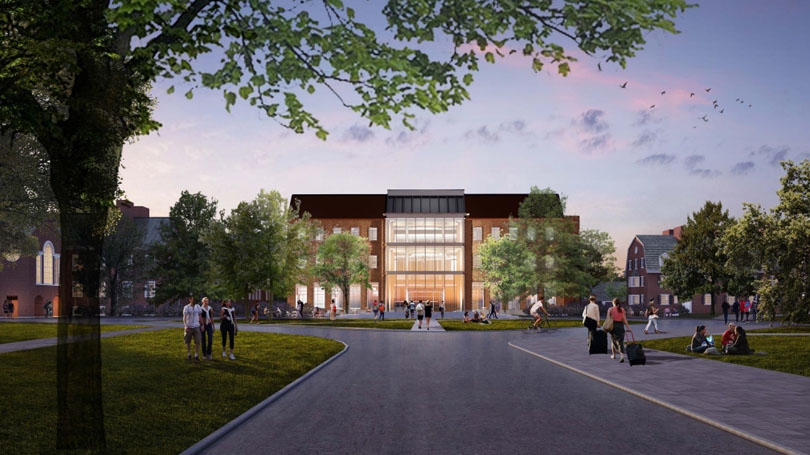
- About
- Education
- Research
- Engagement & Collaboration
- News & Events
Back to Top Nav
Back to Top Nav
Back to Top Nav
Back to Top Nav
The building will be located between the business and engineering schools.
Work will begin today on the building that will house the Arthur L. Irving Institute for Energy and Society. Located between the Tuck School of Business and Thayer School of Engineering on the west end of campus, the building is expected to be ready for occupancy by the fall term of 2021.
The three-story structure, for which the College will seek LEED platinum certification (an internationally recognized green-building certification system), will be built in front of Murdough Hall, filling the space that had been an outdoor courtyard. Murdough, which was home to a number of Tuck offices, will be upgraded and connected to the Irving Institute building by an indoor atrium. Tuck offices that had been located in Murdough have moved to other locations.
"The Irving Institute has grown quickly to enhance education, research, and engagement on critical issues at the interface of energy and society," says institute Director Elizabeth Wilson. "Once constructed, the building will amplify the institute's impact through its labs, meeting spaces, and classrooms. It has been designed to enhance collaboration across all disciplines."
The institute was launched in September 2016, with the announcement of $113 million in gifts committed to create the center, named for Arthur L. Irving. Irving, the chairman of Irving Oil; his wife, Sandra Irving; and their daughter, Sarah Irving '10, Tuck '14, along with Irving Oil and the Arthur L. Irving Family Foundation, provided the lead gift of $80 million for the effort.
The work of the institute addresses the intersection of energy and society, focusing on the challenges and opportunities in transforming today's energy systems to meet the needs of the future. Through educational programming, research funding, and the engagement of campus and community partners, the institute connects faculty and students from many different disciplines—from the natural and social sciences to business and economics to the arts and humanities—to frame and examine the complexities of energy systems and transitions within the context of emerging societal needs.
The approximately 55,000-square-foot building, which will enhance the gateway to Tuck and Thayer, will contain teaching spaces, faculty and research offices, demonstration labs, meeting and collaboration spaces, a cafe, and other space designed to foster informal interaction among faculty, researchers, and students.
In the three years since it was created, the institute has accomplished much: providing seed grants for faculty, staff, and student research and projects; launching a series of energy-themed programs for students, faculty, and staff; creating student experiential learning experiences, including immersion trips giving students first-hand experience to see energy systems; and providing mini-grants to support self-directed learning and research.
The institute is also collaborating with Thayer and the U.S. Army Corps of Engineers' Cold Regions Research and Engineering Laboratory to assess ways to improve energy services, delivery, storage, and mobility in the Arctic. It is planning its first major interdisciplinary conference—"Investing in our Energy Futures"—scheduled for May 2020.
In addition to Wilson, the institute employs a research director, an academic director, and several staff. An external advisory board provides advice on strategy and a board of faculty advisers works with Wilson and staffers.
Initial work on the site will establish the construction area and set up fencing and signage. Work to demolish the northeast corner of Murdough will follow. In mid-November, earth retention systems will be installed to support excavation. Foundations will be set up and poured starting in mid-December and concluding by the end of February, at which time work on erecting the steel frame will begin.
The architectural firm of Goody Clancy of Boston designed the building. Construction work is being managed by Turner Construction, which is also in charge of work on the neighboring Center for Engineering and Computer Science at Thayer.
Susan J. Boutwell can be reached at susan.j.boutwell@dartmouth.edu.